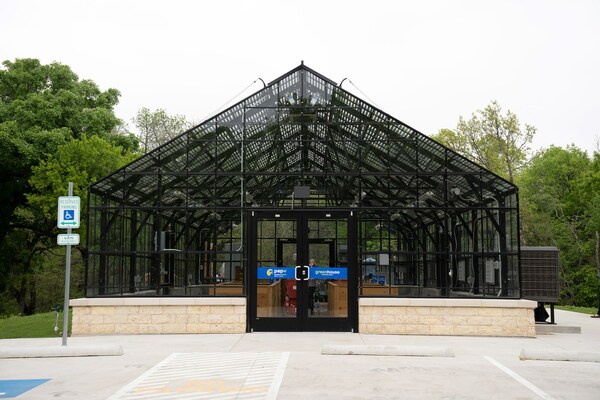The Green Revolution

In 2023, Frito-Lay and Quaker opened a Greenhouse Learning Center in Plano, Texas, used to field test, measure and analyze compostable packaging. Image courtesy of PepsiCo.
The Rise of Compostable Food and Beverage Packaging
By Swapna Gawale, Project Manager at Towards Packaging
Growing public awareness of environmental issues and the need for sustainable packaging solutions are driving substantial expansion in the compostable packaging market.
Conventional packaging materials take up a lot of room in landfills, putting increasing pressure on the capacity of waste management systems. The persistent nature of plastics, which may withstand decades in the environment without naturally disintegrating, is also the source of global concerns about plastic pollution harming human health, endangering wildlife, contaminating water supplies and penetrating ecosystems.
The global compostable packaging market is estimated to grow from $103.39 billion in 2022 to reach an estimated $197.85 billion by 2032, registered at 8.4% compound annual growth rate (CAGR) between 2023 and 2032.
The environmental impact of compostable packaging
Compostable packaging materials provide a workable answer by reducing the load on landfill space, and offer an eco-friendly packaging substitute that can reduce carbon emissions, as well as air, groundwater and soil pollutants. Using compostable materials derived from renewable resources also makes it easier to move towards a circular economy where resources are used for extended periods.
According to the U.S. Composting Council and Biodegradable Products Institute (BPI), certified compostable products conform to standards established by the American Society for Testing Materials (ASTM) or other international testing standards. Materials are tested for biodegradability and toxicity. Compostable materials cannot contain any petroeluem-based products, perfluorinated or polyfuorinated alkyl substances, and break down to form carbon dioxide, water, inorganic compounds and biomass.
Compostable bags support sustainable waste management
Unlike conventional plastic bags and certain biodegradable alternatives, compostable bags are derived from plant-based materials like sugar starch. When adequately moistened, these bags undergo composting, alongside their contents.
Compostable bags are created from renewable resources, and are often composed of natural plant starch. They eliminate the production of harmful substances, and these bags readily decompose in composting systems through microbial action, transforming into compost. Compostable bags typically serve as waste management solutions for households, businesses, and zero-waste events.
Investigating the potential of PLA in compostable packaging
Polylactic acid (PLA) has emerged as a critical material in compostable packaging due to its versatility and eco-friendliness. PLA is biodegradable and compostable, making it a viable alternative to traditional petroleum-based plastics. Its ability to mirror the functioning and appearance of conventional plastics while remaining compostable has boosted its popularity in various packaging applications, including food service products, bags, and films.
PLA’s biocompatibility, low toxicity, and inexpensive cost compared to other biopolymers help to explain its widespread market adoption. As consumer demand for sustainable packaging grows, PLA is positioned to play an essential role in accelerating the shift to a more ecologically conscious packaging industry.
Flexible packaging material innovations
Advances in flexible packaging, such as compostable films, is promoting circularity and reducing waste, and some of the recent innovations include:
- In November 2021, TIPA introduced T. LAM 608, which it describes as a certified, transparent laminate that may be disposed of in household compost bins.
- In September 2023, Charter Next Generation (CNG), a top U.S. specialty filmmaker, and TIPA, a leader in the world of compostable packaging products for food and fashion, announced a collaboration to promote compostable packaging use and local production in the U.S.
- In October 2023, India’s first compostable flexible packaging was introduced by Pakka Limited, formerly Yash Pakka Limited, a business specializing in compostable packaging solutions.
- In November 2023, the first overseas office of UK-based flexible packaging maker Roberts Mart and the launch of its new biodegradable packaging film, Biyo, are expected to enhance the disposal of flexible packaging materials used at home.
- In May 2023, TIPA Compostable Packaging, a developer of totally compostable flexible packaging solutions, acquired Bio4Pack, a European compostable packaging solutions provider.
Food and beverage brands embrace compostable packaging
The food and beverage industries are prominent adopters of compostable packaging among the different sectors pushing its expansion. Food and beverage brands are increasingly looking for compostable packaging solutions to lessen their environmental impact.
Products packaged in compostable materials are becoming increasingly popular among consumers who value eco-friendly solutions, ranging from gourmet beverages to organic snacks. Corporate sustainability objectives and regulatory pressures are pushing this change. Food and beverage producers are investing in research and development to create innovative packaging materials that can preserve the freshness and quality of their products while also being compostable.
Brands unleashing the potential of compostable packaging
Key players like Tipa and Mondi are among the leading inovators in compostable packaging, and recent developments showcase advancements in the food and beverage sectors:
- In September 2021 the Frito-Lay Off the Eaten Path® snack brand unveiled an industrially compostable bag in partnership with Terracyle. Frito-Lay, a PepsiCo® business and snacking industry leader, also announced a goal to design 100% recyclable, compostable, biodegradable or reusable packaging across its portfolio by 2025.
- In October 2023, the nation’s first biodegradable water bottle, manufactured by DFRL, was introduced by Indian Defence Minister Ajay Bhatt during a two-day national conference in Mysore. The substance used to make these environmentally friendly water bottles is polylactic acid (PLA), which addresses the pressing issue of plastic waste and contributes to reducing carbon emissions.
- In April 2023, EcoPods were introduced by Peace Coffee for use with Keurig machines. The plant-based, biodegradable pods are created from natural paper mesh, and are certified compostable in industrial facilities.
Europe is the leading region for compostable packaging
Europe is the leading region in the compostable packaging industry, due to growing consumer awareness of the environmental effects of their purchasing decisions. This transition is seen in studies showing that more than half of European consumers are willing to invest more in sustainable items. As a result, global firms must embrace and invent environmentally friendly packaging solutions that break the cycle of trash disposal.
Compelling figures highlight the importance of bio-waste management in the EU circular economy policy. Recycling 90-116 million tonnes of biowaste into premium compost can improve the quality of 3% to 7% of Europe’s depleted agricultural soils, addressing the continent’s long-standing soil degradation issue. Furthermore, optimizing composting operations can replace considerable amounts of phosphate, potassium, and lime fertilizers, increasing resource efficiency and environmental sustainability.
However market research does not reveal a clear preference for compostable packaging among consumers. However, just over half of European survey respondents expressed a preference for flexible packaging. Some European countries, including Italy, Spain (Cataluña), Norway, Austria, the UK, Switzerland, Belgium, and Luxembourg, have a long history of using compostable bioplastic bags for bio-waste collection.
However, Germany and the Netherlands have lower acceptance levels among biological recycling facility operators. This disparity reflects attitudes and behaviours towards compostable packaging adoption between EU member states.
The advantages of compostable packaging
Compostable packaging is vital in supply chains due to the environmental problems caused by conventional packaging materials, especially plastics. Compostable goods help cut greenhouse gas emissions and are consistent with environmental goals.
Compared to conventional polymers, the production of biodegradable materials usually requires less fossil fuel, reducing carbon emissions. By utilizing compostable packaging, businesses may actively contribute to climate change mitigation by advancing a more sustainable, carbon-neutral supply chain.
About the Author
Swapna Gawale is the Project Manager at Towards Packaging. Swapna is a seasoned research consultant with expertise in conducting and analyzing complex research projects across various industries. With a deep passion for knowledge discovery and a commitment to delivering actionable insights, Swapna has successfully collaborated with numerous organizations to help them make informed decisions and drive strategic growth. Download the report at: https://www.towardspackaging.com/insights/compostable-packaging-market-sizing.







